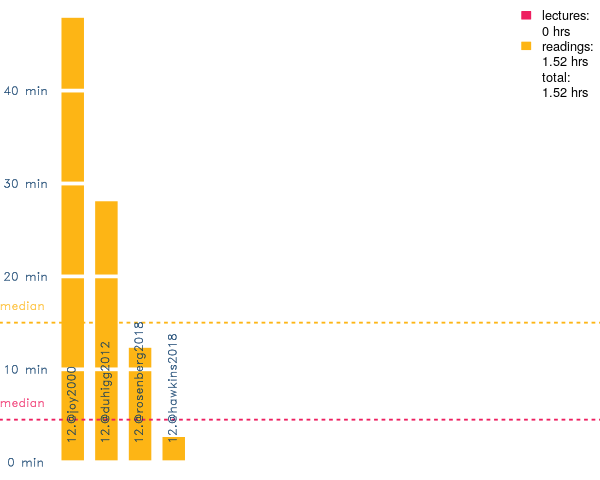12 Data Science Futures
TL;DR: read data science scandals, write your own final prompt
readings (links) & lectures ~ assignments due ~ live session agenda
](img/12minority_report_digital_newspapers.png)
Figure 33: Predictive Policing is Already a Thing
This week we’re reading about the ethical responsibilities and implications of data science. Pay attention to the logic of arguments made. How do we establish accurate expectations about the consequences of data science without teetering too close to the edge of the sci-fi slippery slope? Scandal comes in three flavors.
First, Duhigg (2012) a classic marketing “scandal” involving Target that will be closer to what many data scientists imagine they would want to do with consumer data. Pay attention to the style of The New York Times Magazine especially in its orientation to the truth–compare it to the style of truth you find in The New York Times newspaper article about Cambridge Analytica.
We’ve discussed the scandal potential of Facebook as a data analyzer. Recently we’ve learned a lot about the scandal potential of Facebook as a data vendor. Take a look at recent press releases from Analytica (2018) responding to the political and media cycle set of by Rosenberg, Confessore, and Cadwalladr (2018). How does the ontology of the debate (fundamental categories of what is real or legitimate) differ between the accuser and the accused? Where are the data scientists located in the story, and what are their roles, exposures, and responsiblities?
Finally, consider whether we’re approaching the world described by Joy (2000) in light of a recent tragedy (Hawkins 2018) involving self-driving cars.

Figure 34: Week 12 “reading” time estimated at 250 words per minute
Readings
Lectures
- ↓ 12.1 Introduction to Ethics and Privacy
- ↓ 12.2 Weekly Video
- ↓ 12.3 Assigned Readings
- ↓ 12.4 Law vs. Ethics
- ↓ 12.5 Experiences and Concerns Around Data
- ↓ 12.5.1 Watson and the Department of Defense
- ↓ 12.5.2 The Bill Joy Argument
- ↓ 12.6 Minority Report
- ↓ 12.7 Vectors of Data Science
- ↓ 12.8 Why Companies Imagine Futures
- ↓ 12.9 A View From Herman Miller
- ↓ 12.10 Week 12 Wrap-Up
12.1 Introduction to Ethics and Privacy ↑
| Players | Slug | Excerpt |
|---|---|---|
| τ φ | NA | NA |
12.2 Weekly Video ↑
| Players | Slug | Excerpt |
|---|---|---|
| ω ο | NA | NA |
12.3 Assigned Readings ↑
| Players | Slug | Excerpt |
|---|---|---|
| θ τ | NA | NA |
12.4 Law vs. Ethics ↑
| Players | Slug | Excerpt |
|---|---|---|
| π ψ | NA | NA |
12.5 Experiences and Concerns Around Data ↑
| Players | Slug | Excerpt |
|---|---|---|
| θ μ | NA | NA |
12.5.1 Watson and the Department of Defense ↑
| Players | Slug | Excerpt |
|---|---|---|
| β λ | NA | NA |
12.5.2 The Bill Joy Argument ↑
| Players | Slug | Excerpt |
|---|---|---|
| υ ω | NA | NA |
12.6 Minority Report ↑
| Players | Slug | Excerpt |
|---|---|---|
| φ ψ | NA | NA |
12.7 Vectors of Data Science ↑
| Players | Slug | Excerpt |
|---|---|---|
| ο α | NA | NA |
12.8 Why Companies Imagine Futures ↑
| Players | Slug | Excerpt |
|---|---|---|
| ξ ω | NA | NA |
12.9 A View From Herman Miller ↑
| Players | Slug | Excerpt |
|---|---|---|
| θ α | NA | NA |
Bibliography
Duhigg, Charles. 2012. “How Companies Learn Your Secrets.” The New York Times, February. https://www.nytimes.com/2012/02/19/magazine/shopping-habits.html.
Analytica, Cambridge. 2018. “News CA Commercial.” Accessed March 20. https://ca-commercial.com/news.
Rosenberg, Matthew, Nicholas Confessore, and Carole Cadwalladr. 2018. “How Trump Consultants Exploited the Facebook Data of Millions.” New York Times (Online). https://search.proquest.com/docview/2014763778.
Joy, Bill. 2000. “Why the Future Doesn’t Need Us.” WIRED. https://www.wired.com/2000/04/joy-2/.
Hawkins, Andrew J. 2018. “Uber’s Self-Driving Car Showed No Signs of Slowing Before Fatal Crash, Police Say.” The Verge. https://www.theverge.com/2018/3/19/17140936/uber-self-driving-crash-death-homeless-arizona.